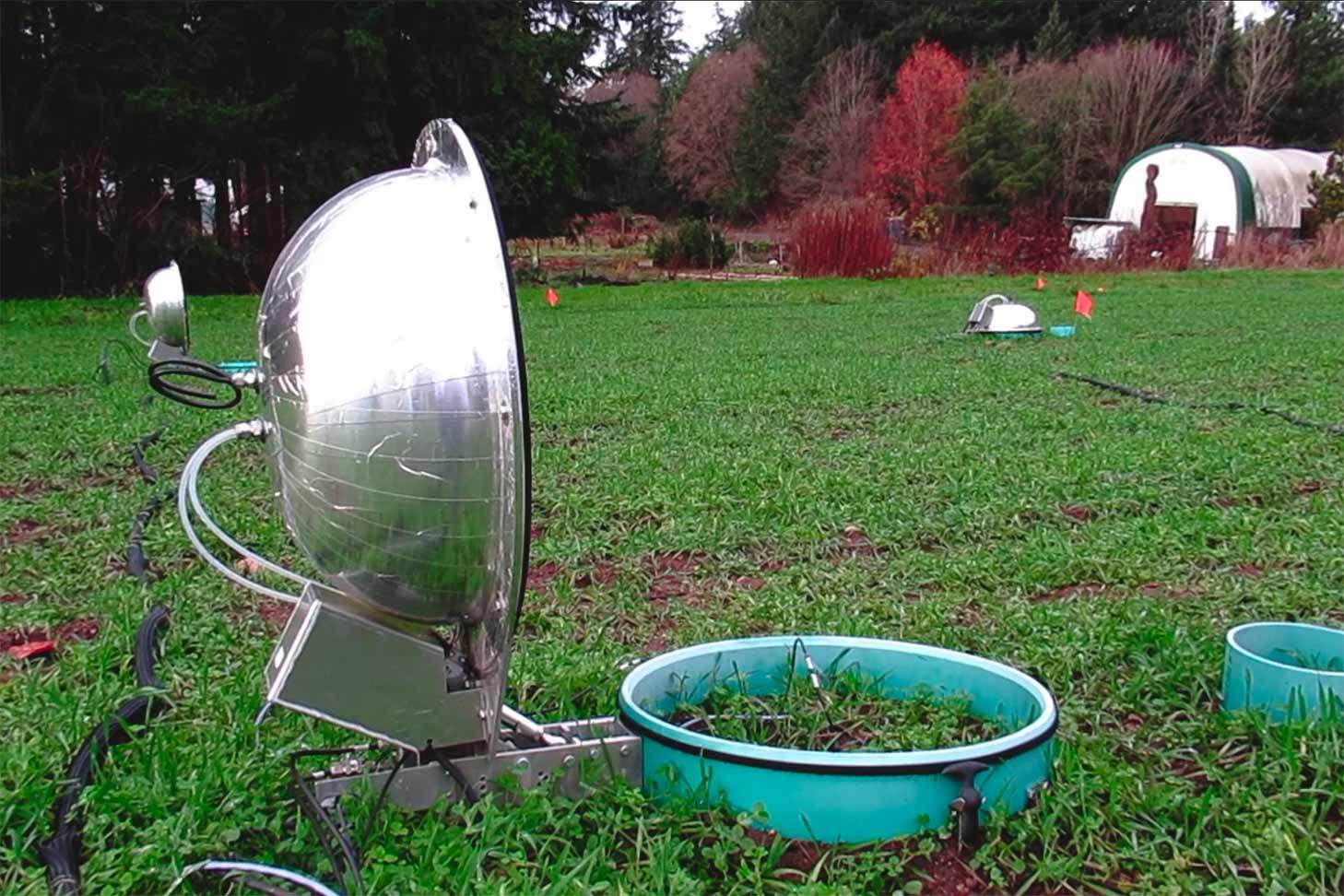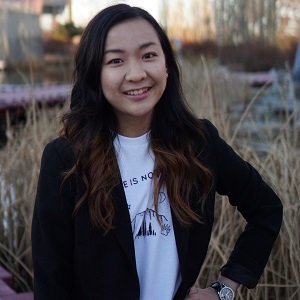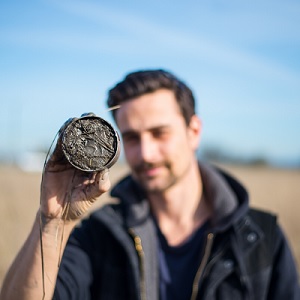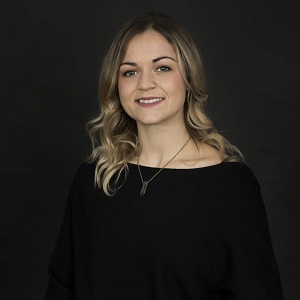Tagged with:
Sarah Common
Tagged with: 2019, Alumni, Global Resource Systems
Iva Jankovic
Tagged with:
Sara Amadi
Tagged with: 2019, Alumni, Global Resource Systems
Good mousekeeping: en suite bathroom makes for happier mice
Tagged with: 2019, Animal Welfare Program, Graduate
LFS researchers use new agriculture technology to measure greenhouse gas emissions

LFS researchers use new agriculture technology to measure greenhouse gas emissions
Researchers at the Faculty of Land and Food Systems have partnered with Orbis Mesh Technologies Inc. in an effort to further study greenhouse gas emissions using chambers on the UBC Farm.
Assistant Professor Sean Smukler is the project’s supervisor. “We’re using Orbis Mesh technology to assess how different the air temperature and pressure is from inside the chamber and outside the chamber,” he said. “This is something that we’ve not been able to do up until now and we’re actually seeing very sizeable differences between inside and outside.”
The chambers automatically open and close on a timer, creating a shifting environment for the plants housed within. The concentration of greenhouse gas emissions within the changing environment are then measured and recorded. The Mesh Network allows for the elimination of cables in the field by wirelessly relaying sensor data.
“If we can start collecting data without the need for tubing and wires, it makes our ability to collect data without impacting farm operations that much better.”
To learn more about how the technology is being used on the UBC Farm, click here.
Tagged with: 2019, Graduate, Sustainable Agriculture and Environment
Valerie Leung
Valerie Leung

About
| Undergraduate | |
| Degree | Bachelor of Science in Food, Nutrition, and Health |
| Major | Dietetics |
| Hometown | Richmond, BC, Canada |
Valerie is an undergraduate student in the Dietetics major. She has been an active student leader in the Faculty as a member of the LFS Undergraduate Society, a Senior Orientation Leader and as a Work Learn student with LFS Student Services. Valerie reports that getting involved is a great way to build connections and build new skills. Read on to learn more!
What are three adjectives that describe you?
Creative, positive, passionate
When you first started at UBC, what resources, people or events helped you to feel welcome and supported?
It was a mixture of feelings. On one hand, I was very excited to see what LFS had to offer in terms of student leadership and career opportunities. On the other, I was the only person in my high school friend group who joined this Faculty. Being a commuter student, I was concerned about making meaningful connections with my peers. Attending Imagine Day, held the first week in September, was essential in meeting fellow LFS-ers and making new friends. Another event that really helped me make friends was LFS Firsts, a two-day camp held every September for first-year LFS students. Here, I went from simply witnessing the welcoming spirit of LFS to fully participating in this amazing community. I met LFS peers that are still my best friends today!
What advice would you give to a high school student considering a program in LFS?
Know what matters to you and your undergrad journey - for me, it was finding a sense of community. I was first drawn to the deep sense of community in LFS by attending UBC Welcomes You, a springtime event held for newly-admitted students. As I began my studies in LFS, I soon discovered so much more than that. This Faculty has provided many valuable academic and career opportunities by challenging me to think with an interdisciplinary perspective. Through unique LFS-based collaborative opportunities, I have been able to practice that mindset in real-life settings within the local community. LFS has opened up my perspectives of what I can accomplish in my career after UBC.
How have your extracurricular experiences prepared you for life after graduation?
Being a part of the LFS Undergraduate Society (LFS|US) has transformed my interpersonal and communication skills, two important aspects of virtually any career. The versatility of the skills that I’ve gained from this experience has already opened more doors to internship and work opportunities, and it motivates me to invest further into my career development.
Participating in the LFS Mentorship Program for the past two years has helped me gain a lot more confidence being an undergraduate student trying to navigate what to do after my time in LFS. I've gone from being a nervous junior mentee that didn’t know what an accomplishment statement was, to being a senior mentee now with a better vision of my strengths and an elevator pitch ready at all times. I feel more confident networking with mentors and professionals in my field, and sharing with people why I am passionate about the career I want to be in!
What advice would you give a student who is about to embark on their own UBC journey?
University is more than lectures, projects, and papers. Have fun exploring it all! I experimented with food photography for the first time in university, joined a foodie magazine chapter at UBC, and went to a coffee tasting event as a media correspondent!
Sign up for events like Storm the Wall, Faculty Cup and Day of the Longboat – don’t be afraid to try new things! Participating in events like these, along with Jump Start and Imagine Day, will prepare you for new experiences and make your time in LFS unforgettable.
Interested in studying in the Faculty of Land and Food Systems? Learn more here!
Tagged with: Dietetics, Food Nutrition and Health, Undergraduate
Research on Delta farms can improve soil productivity and drainage

New UBC findings on Delta farms can improve soil productivity and drainage
March 25, 2019 – Farming in Delta, B.C., is becoming increasingly challenging due to the high cost of land, urban encroachment, and impending climate change challenges that include more frequent weather extremes, prolonged droughts and rising sea levels.
To investigate how to make farming more sustainable for Delta producers in light of these challenges, UBC’s Maja Krzic and Sean Smukler are running a five-year study evaluating the impacts of grassland set-asides on soils and crop yields in the Fraser River delta. A set-aside involves resting soil for one to four years by replacing cash crops with a mixture of grasses and legumes to improve the productivity of the land over the long-term.
As part of this study Jason Lussier (photo above, courtesy of Adrian MacNair), a recent MSc graduate from the UBC Soil Science Program, led a study of eight fields in the set-aside program to evaluate the influence on soil structure and compaction, which are key for crop productivity. The Canadian Journal of Soil Science has published this research, providing important findings that will assist producers in the Fraser River delta to integrate grassland set-asides more effectively into their farming operations.
The UBC research team included Lussier, Associate Professor Krzic, Assistant Professor Smukler, Associate Professor Emeritus Art Bomke, and Drew Bondar, Program Manager at Delta Farmland & Wildlife Trust (DF&WT).
They discovered farmers who enrolled fields that were productive saw improved soil productivity after two seasons in the grassland set-aside program. Those who enrolled fields that were highly degraded with very little, if any at all, vegetation saw different results. As vegetation is largely what provides restorative benefits to the soil, as expected, the highly degraded fields did not show any differences in soil properties after two seasons in the program.
These finding support using grassland set-asides on productive fields in the Fraser River delta region for a duration of two seasons as a crop rotation practice to improve soil productivity. Degraded fields likely require additional management practices, or a longer period of enrollment, before seeing improvements.
The team was also able to identify sodium levels in soils as a good indicator for determining which fields may or may not be suitable for the program. Much of the farmland in the Fraser River delta is surrounded by ocean, and some fields in the region are vulnerable to the accumulation of ocean salts, such as sodium, either through ocean water intrusion or salt contamination in irrigation water. High levels of sodium are highly toxic to plants and may also be an indicator underlying drainage issues – both of these factors can severely hinder vegetation growth and may lead to highly degraded farmland.
The research team set preliminary thresholds of soil sodium levels that will be of practical value to farmers in determining which fields should be incorporated into the Grassland Set-aside Stewardship Program and which fields likely need other management practices to address land productivity issues prior to being enrolled in this program. Salinity-related issues are projected to increase in Delta due to climate change-induced sea level rise and this preliminary work may also provide a foundation for future studies that will evaluate the impacts of this important soil property on crop production.
Having grown up in the Fraser River delta region of B.C., Lussier is proud to have been part of this research, which will contribute to a productive agricultural industry in the region for the benefit of both farmers and the community.
Lussier has been Coordinator of the BC Agricultural Climate Adaptation Research Network for the last two years. He has worked with researchers, industry specialists, policy-makers, farmers and ranchers from across the province to promote cross-sector collaboration in the development of a climate-resilient agriculture sector.
This research was carried out in close collaboration with DF&WT, a local organization that provides farmers in the Fraser River delta region of B.C. with cost-share payments to undertake land management practices that promote both wildlife conservation and sustainable agricultural operations.
DF&WT funds the Grassland Set-aside Stewardship Program so farmers in the region can rest their fields under a grass and clover stand for up to four years. UBC researchers have been collaborating with the DF&WT for more than 25 years. This study is just one example of how academic cooperation with external partners can provide applied research findings that directly contribute to the local farming community.
The primary funder of this grassland set-aside project was Agriculture and Agri-Food Canada (AAFC). DF&WT, Mitacs, NSERC and UBC have also contributed funding to the project.
For more information, contact:
Karen Lee
UBC Faculty of Land and Food Systems
604-827-5297
karen.lee98@ubc.ca
Tagged with: 2019, Faculty, Soil Science
Courtney Boyd
Courtney Boyd

About
| Graduated, November 2020 | |
| Degree | Bachelor of Science in Applied Biology |
| Major | Applied Animal Biology (Honours) |
| Hometown | Vancouver, B.C. |
Courtney is a recent graduate from the Applied Biology program. Courtney combined her love of animals and scientific research into her work at a BC Cancer Research Centre immunology lab and as a researcher in LFS’s Animal Welfare Department with rodents.
What are three adjectives that describe you?
Curious, passionate, and motivated
Why did you choose the Faculty of Land and Food Systems?
I chose the Faculty of Land and Food Systems specifically for their program in Applied Animal Biology. But when I graduated from high school, I actually had no idea I was interested in science! When I decided I wanted to pursue Applied Animal Biology it meant I had to go back and take the required high school prerequisites. It was daunting, but now I am so happy I stuck it out. What surprised me is how passionate I became about science in general as I started taking my core classes. I also loved the flexibility in the upper years of this program which has allowed me to pursue the areas of animal science that I am most interested in.
How did you first become interested in Applied Animal Biology?
Being an animal lover, applying for a program in animal studies seemed like a no-brainer, and I was excited about the opportunity to learn about their behaviour and biology! Then, after getting involved in immunology and cancer research, I was torn between my love of animals and my newfound interest in biomedical research. After consulting with my Program Advisor, I realized I could combine these interests in the animal welfare department in LFS – I didn’t have to choose! This department works to find ways to improve animal welfare by applying the principles of biological science and research. My main focus is now centered around improving and refining euthanasia methods for rodents used in research.
Who was your favourite instructor and what impact have they had on your LFS experience?
It's so hard to pick just one favourite instructor in LFS! I would have to say that Professor Dan Weary has had the most impact on my academic career. Dr. Weary guided me through my first research experience in APBI 398: Research Methods in Applied Biology, selected me as his candidate for the NSERC-USRA (which I won!), and acted as my principal investigator in my work for the animal welfare department. He has provided me opportunities to design and conduct my own experiments in an area that is so important to me. I am eternally grateful for his guidance, support, and always having faith in me.
What kind of career do you hope to pursue after your degree, and how has your experience prepared you for this?
These experiences have given me a glimpse of what a career in research could look like after I graduate, and I have a much better understanding of executing research from start to finish. I hope to continue working in the field of lab animal welfare; I believe it is our responsibility as scientists to improve the quality of life for animals used in research labs. Having an opportunity to take two fields of interest that seemed worlds apart and combining them in an exciting and innovative way will also be an asset as a graduate student.
Being a mature undergraduate student provided a lot of clarity about the goals I wanted to achieve, and it helped me prioritize my academic success. So if any prospective students ever feel like it's too late, don't let that hold you back from doing something you're genuinely passionate about.
Interested in studying in the Faculty of Land and Food Systems? Learn more here!
Tagged with: 2019, Applied Biology, Undergraduate
Derek Dee

Derek Dee
Assistant Professor, Food, Nutrition and Health (Food Science)
604-822-4489
FNH 240, 2205 East Mall
University of Alberta, Postdoctoral fellow, Dept. of Physics
University of Guelph, PhD, Biophysics
University of Guelph, MSc, Food Science
University of Saskatchewan, Hons., Food Science
Our research seeks to understand the forces that govern protein structure and function, with an emphasis on potential applications in food, biomaterials and medicine.
Current projects focus on protein folding, aggregation, and engineering amyloid-like nanomaterials. We are examining ways to control the self-assembly of food proteins into nanofibrils with differing functional properties, while also assessing whether these novel nanomaterials are safe for direct food application. Another research focus is utilizing novel bioconjugate chemistry and molecular biology tools to engineer proteins with non-standard amino acids. These can then be targeted for specific labelling to study protein modifications such as glycosylation, or to create nanofibrils fused with other functional domains to create novel devices and materials.
This research involves a variety of biochemical, molecular biology and biophysical approaches and offers a training environment that blends basic and applied sciences to better understand and utilize food proteins and enzymes.
Graduate Students: Potential graduate students who are interested in applying fundamental concepts (e.g., from biophysics, biochemistry, molecular biology, bioinformatics, or molecular dynamics) to understand proteins for food or health applications are encouraged to apply. Please contact me (derek.dee@ubc.ca) and include your CV and a description of your research interests.
Alberta Innovates Health Solutions Postdoctoral Fellowship
Ontario Graduate Scholarship
Natural Sciences and Engineering Research Council (NSERC) Post Graduate Scholarship
Click here for a complete list of publications.
Rahimi Araghi L., Dee, D.R. (2020) Cross-species and cross-polymorph seeding of lysozyme amyloid reveals a dominant polymorph. Frontiers in Molecular Biosciences, 7: 206.
Cheung L.K.Y., Dupuis J.H., Dee, D.R., Bryksa B.C., Yada, R.Y. (2020) Roles of plant-specific inserts in plant defense. Trends in Plant Science, 25: 682-694.
Liu L., Kerr, W.L., Kong, F., Dee, D.R., Lin, M. (2018) Influence of nano-fibrillated cellulose (NFC) on starch digestion and glucose absorption. Carbohydrate Polymers, 196: 146-153.
Sen Mojumdar, S., Scholl, N., Dee, D.R., Rouleau, L., Anand, U., Garen, C., Woodside, M.T. (2017) Partially native intermediates mediate misfolding of SOD1 in single-molecule folding trajectories. Nature Communications, 8:1881.
Dee, D.R., Woodside, M.T. (2016) Comparing the energy landscapes for native folding and aggregation of PrP. Prion, 10: 207-220.
Neupane, K., Foster, D.A.N., Dee, D.R., Yu, H., Wang, F., Woodside, M.T. (2016) Direct observation of transition paths during the folding of proteins and nucleic acids. Science, 352: 239-242.
Yu, H.*, Dee, D.R.*, Liu, X., Brigley, A.N., Sosova, I., Woodside, M.T. (2015) Protein misfolding occurs by slow diffusion across multiple barriers in a rough energy landscape. Proceedings of the National Academy of Sciences of the United States of America, 112: 8308-8313. *co-first authors
Tagged with: Faculty, Food Science, Master of Food Science